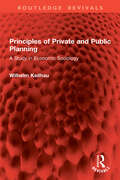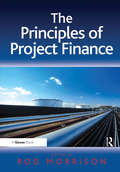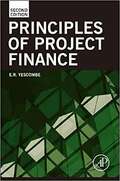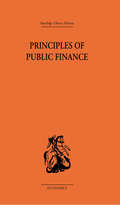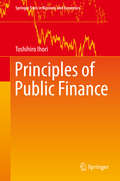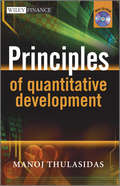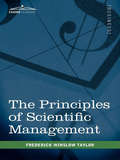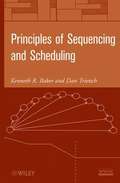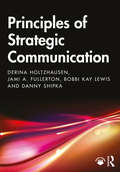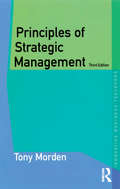- Table View
- List View
The Principles of Political Economy and Taxation
by David RicardoThis landmark treatise of 1817 formulated the guiding principles behind the market economy. Author Ricardo, with Adam Smith, founded the classical system of political economy, a school of thought that dominated economic policies throughout the 19th century and figured prominently in the theories of John Stuart Mill and Karl Marx.
Principles of Political Economy and Taxation [1911 Edition]
by David RicardoThis landmark treatise formulated the guiding principles behind the market economy. Author Ricardo, with Adam Smith, founded the classical system of political economy, a school of thought that dominated economic policies throughout the 19th century and figured prominently in the theories of John Stuart Mill and Karl Marx.-Print ed.
Principles of Pricing
by Robert J. Dolan John T. GourvillePresents the basic principles of pricing, including value pricing, price sensitivity, and price customization/discrimination.
Principles of Private and Public Planning: A Study in Economic Sociology (Routledge Revivals)
by Wilhelm KeilhauPrinciples of Private and Public Planning (1951) looks at a key economic question: plan or no plan? By examining the economic theories of both planned and unplanned economies together with human and societal impulses, it aims to provide both an analysis and overview of the topic.
Principles of Product Policy
by Anita ElberseProvides an introduction to key product policy issues.
Principles of Project and Infrastructure Finance
by Willie TanCurrent books on project finance tend to be non-technical and are either procedural or rely heavily on case studies. In contrast, this textbook provides a more analytical perspective, without a loss of pragmatism. Principles of Project and Infrastructure Finance is written for senior undergraduates, graduate students and practitioners who wish to know how major projects, such as residential and infrastructural developments, are financed. The approach is intuitive, yet rigorous, making the book highly readable. Case studies are used to illustrate integration as well as to underscore the pragmatic slant.
The Principles of Project Finance
by Rod MorrisonThe Principles of Project Finance reviews the technique of project finance. It explores, step-by-step, the key ingredients of the concept. The book is aimed at a business savvy audience, but one which is not necessarily up to speed on the concept, and has a global reach by covering both OECD countries and the emerging markets. Project finance is positioned at a key point between the global capital markets and the energy and infrastructure industries. To explain and illustrate the ideas behind project finance, the book is made of chapters written by a range of leading players in the market from around the world and is split into four sections: ¢ The first reviews various themes and issues key to the project finance market - views from bankers, lawyers and advisers plus chapters on bank, bond and multilateral finance and a look at environmental, insurance and construction market issues. ¢ The second section looks at how project finance is used in various sectors of the energy and infrastructure market - renewable energy, oil and gas, mining, PPPs and roads and transportation. ¢The third then takes an in-depth look at various projects finance markets from around the world - Australia, Vietnam, Indonesia, India, Turkey, Russia, Africa, France, USA and Brazil. ¢ Finally, the fourth section presents a series of Top 10 deal cases studies from the pages of Thomson Reuters Project Finance International (PFI), the leading source of global project finance information.
Principles of Project Finance
by E. R. YescombeThe Second Edition of this best selling introduction for practitioners uses new material and updates to describe the changing environment for project finance. Integrating recent developments in credit markets with revised insights into making project finance deals, the second edition offers a balanced view of project financing by combining legal, contractual, scheduling, and other subjects. Its emphasis on concepts and techniques makes it critical for those who want to succeed in financing large projects. With extensive cross references and a comprehensive glossary, the Second Edition presents anew a guide to the principles and practical issues that can commonly cause difficulties in commercial and financial negotiations. <p><p> <ul> <li>Provides a basic introduction to project finance and its relationship with other financing techniques</li> <li>Describes and explains: sources of project finance; typical commercial contracts (e.g., for construction of the project and sale of its product or services) and their effects on project finance structures; project finance risk assessment from the points of view of lenders, investors, and other project parties; how lenders and investors evaluate the risks and returns on a project; the rôle of the public sector in public private partnerships and other privately financed infrastructure projects; how all these issues are dealt with in the financing agreements</li> </ul>
Principles of Public Finance (Routledge Library Editions)
by Hugh Dalton'Dalton has succeeded in expressing general economic concepts in simple language' The Economist. The 1971 edition of this famous textbook includes recent material to the general survey on the theory of taxation, other forms of public revenue, public expenditure and public debts. There are chapters on modern theories of budgetary policy and the controversial cheap money policy, pursued by the author when he was in charge of the British Treasury from 1945-1947.
Principles of Public Finance
by Toshihiro IhoriThis textbook equips instructors and students with an overview of the existing literature so that the latter can attain an overall understanding of macroeconomic and microeconomic public finance. The literature on public finance has grown dramatically with theoretical studies and empirical analysis, and much of the focus has been on macroeconomic effects of public services. The standard textbook offerings, however, are mainly restricted to microeconomic topics of public finance. This text intends to fill this gap by presenting a theoretical-based, comprehensive explanation of public finance. Particular emphasis is directed at developing tools that can be applied theoretically and empirically to clarify essential economic concerns in the current public sector in advanced countries, including Japan. Such concerns include the macroeconomic effect of fiscal policy, the dependence on bonds for covering government deficits, and social security reform. The main text explains the standard concepts of public finance, and the appendix offers various advanced topics. The material will facilitate an understanding of how to investigate changes in the public sector, interpret results, and basically do research on fiscal policy. The textbook will be of value to a broad range of course offerings, including those generally focused on fiscal policy, on social security reform and on tax reform.
Principles of Public Speaking
by Kathleen GermanBalancing skills and theory, this introductory public speaking textbook encourages the reader to see public speaking as a way to build community in today’s diverse world. Within a framework that emphasizes speaker responsibility, listening, and cultural awareness, this classic book uses examples from college, workplace, political, and social communication to make the study of public speaking relevant, contemporary, and exciting. This new edition includes expanded coverage of mediated speaking with examples from podcasts and online speaking contexts; discussion of ethical issues of contemporary public discourse, including disinformation and public civility; and tips for extemporaneous speaking. This textbook is ideal for general courses on public speaking as well as specialized programs in business, management, political communication, and public affairs. A companion website including an instructor’s manual containing discussion questions, exercises, quiz questions, and suggestions for syllabus design is available at www.routledge.com/cw/german.
Principles of Quantitative Development
by Manoj ThulasidasPrinciples of Quantitative Development is a practical guide to designing, building and deploying a trading platform. It is also a lucid and succinct exposé on the trade life cycle and the business groups involved in managing it, bringing together the big picture of how a trade flows through the systems, and the role of a quantitative professional in the organization.The book begins by looking at the need and demand for in-house trading platforms, addressing the current trends in the industry. It then looks at the trade life cycle and its participants, from beginning to end, and then the functions within the front, middle and back office, giving the reader a full understanding and appreciation of the perspectives and needs of each function. The book then moves on to platform design, addressing all the fundamentals of platform design, system architecture, programming languages and choices. Finally, the book focuses on some of the more technical aspects of platform design and looks at traditional and new languages and approaches used in modern quantitative development.The book is accompanied by a CD-ROM, featuring a fully working option pricing tool with source code and project building instructions, illustrating the design principles discussed, and enabling the reader to develop a mini-trading platform.The book is also accompanied by a website http://pqd.thulasidas.com that contains updates and companion materials.
Principles of Radical Decentralization: Moving Beyond Budgeting
by Jeremy Hope Robin FraserIt is not difficult to see why the budgeting process is such a barrier to effective empowerment. It restricts decision making to specified plans and budgets, and it assumes the absence of trust. This chapter outlines some common principles that leaders have used to remove these barriers to empowerment and transform their organizations.
Principles Of Responsible Management: Glocal Sustainability, Responsibility, And Ethics
by Roger Conaway Oliver LaaschPRINCIPLES OF RESPONSIBLE MANAGEMENT offers an international, scientifically sound, and strictly practice-related perspective. It is the first official textbook of the United Nations for the Principles for Responsible Management Education (PRME) academic network, and a reference book for companies of the United Nations Global Compact Initiative. It is a primary text for traditional business and society, business ethics, corporate social responsibility, and sustainability courses, or may serve as a practitioner handbook. Contributors are renowned academic professionals in their respective chapter topics as well as distinguished business practitioners who contribute highly relevant practice cases.
Principles of Retailing
by John Fernie Suzanne Fernie Christopher MooreRetailing is one of the biggest and most important sectors in today's economy. Graduates who are seeking a career in the sector will therefore require a solid knowledge of its core principles. The Principles of Retailing Second Edition is a topical, engaging and authoritative update of a hugely successful textbook by three leading experts in retail management designed to be a digestible introduction to retailing for management and marketing students. The previous edition was praised for the quality of its coverage, the clarity of its style and the strength of its sections on operation and supply chain issues such as buying and logistics, which are often neglected by other texts. This new edition has been comprehensively reworked in response to the rapid changes to the industry, including the growth of online retail and the subsequent decline of physical retail space and new technologies that improve customer experience and help track consumer behaviour. It also builds upon the authors' research over the last decade with new chapters on offshore sourcing and CSR and product management in addition to considerable revisions to existing chapters to highlight changes in online retailing and e-tail logistics, retail branding, retail security, internationalisation and the fashion supply chain. This edition will also be supported by a collection of online teaching materials to help tutors spend less time preparing and more time teaching.
The Principles of Scientific Management
by Frederick Winslow TaylorThe basis of modern organization and decision theory, this influential essay has motivated administrators and students of managerial technique for more than 80 years. The author discusses eliminating inefficiency through a system based on principles applicable to individual and collective activities. A ground-breaking, and still-inspiring work.
The Principles of Scientific Management
by Frederick Winslow TaylorIt seems, at first glance, like an obvious step to take to improve industrial productivity: one should simply watch workers at work in order to learn how they actually do their jobs. But American engineer FREDERICK WINSLOW TAYLOR (1856-1915) broke new ground with this 1919 essay, in which he applied the rigors of scientific observation to such labor as shoveling and bricklayer in order to streamline their work... and bring a sense of logic and practicality to the management of that work. This highly influential book, must-reading for anyone seeking to understand modern management practices, puts lie to such misconceptions that making industrial processes more efficient increases unemployment and that shorter workdays decrease productivity. And it laid the foundations for the discipline of management to be studied, taught, and applied with methodical precision.
The Principles of Scientific Management
by Frederick Winslow TaylorFor more than 80 years, this influential work by Frederick Winslow Taylor -- the pioneer of scientific management studies -- has inspired administrators and students of managerial techniques to adopt productivity-increasing procedures. Indeed, this book laid the groundwork for modern organization and decision theory.As an engineer for a steel company, Taylor made careful experiments to determine the best way of performing each operation and the amount of time it required, analyzing the materials, tools, and work sequence, and establishing a clear division of labor between management and workers. His experiments resulted in the formulation of the principles expounded in this remarkable essay, first published in 1911.Taylor advocated a scientific management system that develops leaders by organizing workers for efficient cooperation, rather than curtailing inefficiency by searching for exceptional leaders someone else has trained. The whole system rests upon a foundation of clearly defined laws and rules. Moreover, the fundamental principles of scientific management apply to all kinds of human activities, from the simplest individual acts to the most elaborate cooperative efforts of mighty corporations. Correct application of these principles, according to Taylor, will yield truly astonishing results.
Principles of Security and Crime Prevention
by Clifford W. Van Meter Truett A. Ricks Pamela A. CollinsThis introductory text provides a thorough overview of the private security system. This edition includes crime prevention and its zones of protection - the theoretical framework that provides the bridge between private and public sector law enforcement. From the historical development and the professional nature of security and crime prevention to the legal aspects of private security, this well-rounded text covers basic elements of security and crime prevention.
Principles of Sequencing and Scheduling (Wiley Series in Operations Research and Management Science)
by Kenneth R. Baker Dan TrietschAn updated edition of the text that explores the core topics in scheduling theory The second edition of Principles of Sequencing and Scheduling has been revised and updated to provide comprehensive coverage of sequencing and scheduling topics as well as emerging developments in the field. The text offers balanced coverage of deterministic models and stochastic models and includes new developments in safe scheduling and project scheduling, including coverage of project analytics. These new topics help bridge the gap between classical scheduling and actual practice. The authors—noted experts in the field—present a coherent and detailed introduction to the basic models, problems, and methods of scheduling theory. This book offers an introduction and overview of sequencing and scheduling and covers such topics as single-machine and multi-machine models, deterministic and stochastic problem formulations, optimization and heuristic solution approaches, and generic and specialized software methods. This new edition adds coverage on topics of recent interest in shop scheduling and project scheduling. This important resource: Offers comprehensive coverage of deterministic models as well as recent approaches and developments for stochastic models Emphasizes the application of generic optimization software to basic sequencing problems and the use of spreadsheet-based optimization methods Includes updated coverage on safe scheduling, lognormal modeling, and job selection Provides basic coverage of robust scheduling as contrasted with safe scheduling Adds a new chapter on project analytics, which supports the PERT21 framework for project scheduling in a stochastic environment. Extends the coverage of PERT 21 to include hierarchical scheduling Provides end-of-chapter references and access to advanced Research Notes, to aid readers in the further exploration of advanced topics Written for upper-undergraduate and graduate level courses covering such topics as scheduling theory and applications, project scheduling, and operations scheduling, the second edition of Principles of Sequencing and Scheduling is a resource that covers scheduling techniques and contains the most current research and emerging topics.
Principles of Sequencing and Scheduling
by Kenneth R. Baker Dan TrietschAn up-to-date and comprehensive treatment of the fundamentals of scheduling theory, including recent advances and state-of-the-art topicsPrinciples of Sequencing and Scheduling strikes a unique balance between theory and practice, providing an accessible introduction to the concepts, methods, and results of scheduling theory and its core topics. With real-world examples and up-to-date modeling techniques, the book equips readers with the basic knowledge needed for understanding scheduling theory and delving into its applications. The authors begin with an introduction and overview of sequencing and scheduling, including single-machine sequencing, optimization and heuristic solution methods, and models with earliness and tardiness penalties. The most current material on stochastic scheduling, including correct scheduling of safety time and the use of simulation for optimization, is then presented and integrated with deterministic models. Additional topical coverage includes:Extensions of the basic modelParallel-machine modelsFlow shop schedulingScheduling groups of jobsThe job shop problemSimulation models for the dynamic job shopNetwork methods for project schedulingResource-constrained project schedulingStochastic and safe schedulingExtensive end-of-chapter exercises are provided, some of which are spreadsheet-oriented, and link scheduling theory to the most popular analytic platform among today's students and practitioners--the Microsoft Office Excel® spreadsheet. Extensive references direct readers to additional literature, and the book's related Web site houses material that reinforces the book's concepts, including research notes, data sets, and examples from the text.Principles of Sequencing and Scheduling is an excellent book for courses on sequencing and scheduling at the upper-undergraduate and graduate levels. It is also a valuable reference for researchers and practitioners in the fields of statistics, computer science, operations research, and engineering.
Principles of Solar Gas Turbines for Electricity Generation (Green Energy and Technology)
by Amos MadhlopaThis is the first book dedicated to solar gas turbines, providing fundamental knowledge and state-of-the-art developments in the field. A gas turbine is a heat engine in which a mixture of fuel and air is burned in a chamber that is an integral part of the flow circuit of the working fluid. The burnt gas mixture expands and turns the turbine, which can be connected to a generator for electricity production. Solar gas turbines offer an important alternative to conventional gas turbines driven by non-renewable, polluting fossil fuels such as diesel or natural gas. The book provides a comprehensive overview of the topic as well as numerous illustrations.
Principles of Strategic Communication
by Derina Holtzhausen Jami Fullerton Bobbi Kay Lewis Danny ShipkaDesigned to support the paradigm shift in media and communication, this book presents the basic tenets of strategic communication and its foundational disciplines of advertising, public relations, and marketing communications. Drawing on the latest research in the field, the text introduces students to the theories of strategic communication while at the same time outlining how to apply them to everyday practice. To facilitate learning and tie concepts to practice, each chapter includes introductory focus questions, a contemporary global case study, a career profile of a current practitioner, end-of-chapter discussion questions, and features that highlight how research methods can be applied to strategic communication practice. Principles of Strategic Communication is ideal as a core text for undergraduate students in strategic communication courses within media, communication, marketing, and advertising programs. The accompanying online support material features chapter summaries, useful links to examples of strategic communication in action, suggested further reading, and practice test questions. Instructors will find an instructor’s resource manual that includes sample syllabi, class activities, lecture topics, and a test bank.
Principles of Strategic Management (Innovative Business Textbooks)
by Tony MordenNow published in its Third Edition, Principles of Strategic Management by Tony Morden is a proven textbook that offers a comprehensive introduction to the study and practice of strategic management. This new edition covers the fundamentals of strategic analysis and planning, strategy formulation, strategic choice, and strategy implementation. It contains new material on leadership and corporate governance, and on the strategic management of time, risk, and performance. There is a new chapter on the key issue of crisis and business continuity management. The book retains the strong international flavour of its predecessors. The book is constructed in sharply focused Parts and Chapters. The text is then broken down into accessible Sections. The presentation is clear and reader-friendly. Principles of Strategic Management is ideal for use on undergraduate, conversion masters, and MBA courses in business and management. Its reader-friendly approach also makes it suitable for block-release type courses, distance-learning programmes, self-directed study, in-company training, and continuing personal professional development.
The Principles of Successful Freelancing: Control Your Destiny - Become a Successful Freelancer Today!
by Miles BurkeThinking about becoming your own boss and embarking on the wonderful and rewarding journey of freelancing? The Principles of Successful Freelancing is for you. In this easy-to follow guide you'll learn what's important in transforming your skills into a booming freelance business.This book leads you through the entire process, from getting started, through to winning and keeping loyal clients. Running a successful freelance business is easy, and with the information in this book, you'll confidently turn your freelancing dream into a profitable reality. Learn how to make a smooth transition into freelancing Understand how to effectively manage your money Ensure you spend your time on the right activities Discover why a work/life balance is important Learn how your network can support you and your business Overcome your fear of sellingAnd much more ...The 12 Principles Of Successful Freelancing Get OrganizedKeep your workspace tidy and plan ahead(short- and long-term).Control StressRemain calm and work through issues to avoid early burnout..ResearchSpend quality time researching your proposed business-it's more than a five minute web surf.Be PassionateLove your work! You should enjoy what you do for a living.BudgetSave for a rainy day rather than spend every centas it comes in.Value your HealthBad health stops you from working. Take time to exercise and maintain a nutritious diet.Embrace SellingEnjoy the sales challenge-it's easier than you think!Satisfy CustomersDon't do average work-exceed their expectations and make them need you.Grow Your NetworkValue family and friends' support, and meet new people all the time.Maintain CashflowIt's what is in the bank that counts, not what you are billing-understand the difference.Continually LearnKeep acquiring new skills and knowledge, every week. Let it slip and you could be left behind.Achieve a Work/Life BalanceYour life should be more than work-maintain a good balance for health and success.



